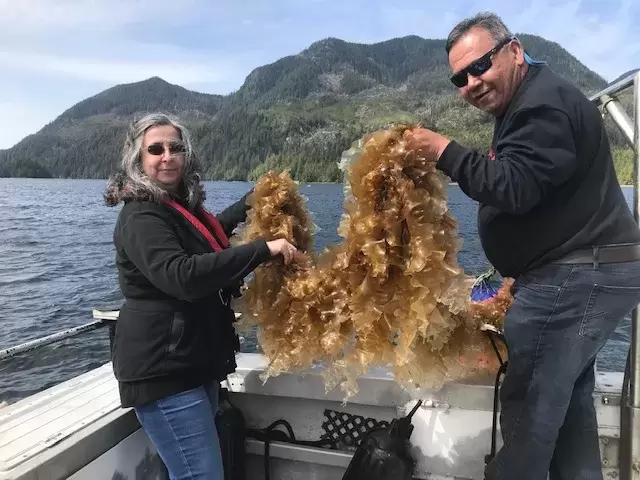The Nuu-chah-nulth Seafood Limited Partnership (NSLP) is certainly not resting on its laurels.
In 2018 the Port Alberni-based company was one of the recipients of a BC Indigenous Business Award via the Business Partnership of the Year category.
The NSLP has continued to make positive strides since garnering that award, presented by the BC Achievement Foundation.
It was announced in mid September that the NSLP has entered into an agreement with Cascadia Seaweed Corporation to cultivate seaweed for an ever-demanding global market.
Larry Johnson, who has been the NSLP president for 11 years, said the NSLP/Cascadia partnership was forged rather quickly.
“I’m surprised how fast we’re pulling it together,” he said. “We created a strategic plan and are working towards an end goal.”
NSLP officials kicked off a research project this past January with four test sites for growing kelp.
Johnson said it was this past June when his company first met Cascadia executives at a conference in Courtenay. There was mutual admiration for the businesses’ work.
“All things came together quickly,” Johnson said. “And we agreed to talk more.”
In August, a Memorandum of Understanding was signed between the two parties.
Following NSLP’s research project earlier this year, two locations were chosen – in Barkley Sound and in Useless Inlet, which is near the beginning of the Alberni Inlet – to begin cultivation in partnership
“These two areas proved to be the best growing sites,” Johnson said.
Mike Williamson, the president of the Cascadia Seaweed Corporation, is thrilled with the new partnership with the NSLP.
“This is an exciting market, and kelp and other high-quality seaweeds will comprise an increasingly large part of diets and industrial processes,” he said in a news release.
Williamson added he’s anticipating working alongside NSLP officials.
“We look forward to the contributions we can make to diversification and support in local communities,” he said.
The NSLP began as a shellfish development corporation in 2003. The business is now owned by six Nuu-chah-nulth First Nations.
They are Huu-ay-aht, Ditidaht, Mowachaht/Muchalaht, Ka:’yu:’k’t’h’/Che:k’tles7et’h’ First Nations, Yuułuʔiłʔatḥ Government and the Uchucklesaht Tribe.
After provincial licensing has been granted, Johnson expects seeding of the Barkley Sound and Useless Inlet areas, covering several acres, to begin soon.
“It all depends,” he said. “But my sense is it will start at the end of October or early November.”
Harvesting will then be done next May or June where the yield is expected to be a whopping 90 tons of kelp.
“We’ll have to monitor it weekly,” Johnson added. “And it depends on what type of winter we have.”
Johnson is expecting this new venture will create some new employment.
“I think it will be 2-3 new jobs per site,” he said.
Johnson said the partnership with Cascadia is for three years. The two companies have already discussed future development, hopefully quickly growing seaweed in areas covering 20 hectares.
“We have such underused coastlines,” Johnson said.
The process of farming seaweed begins by attaching seedlings onto a rope, strung between two vertical lines. An anchor and a float are also used. The rope is placed into water where the seaweed grows. To harvest it is brought onto a boat where it is cut from the rope and brought to shore. After processing it can be sold either in Canada or abroad.
“I think all of the plant will be used in one form or another,” Johnson said.
Besides eating seaweed, people utilize it as a source for vitamins. It’s also used for cosmetics and other industrial uses.
Johnson anticipates the venture with Cascadia Seaweed Corporation will be a rather successful one. And it will assist with a growing demand.
“I think globally it’s huge,” he said of the seaweed market. “We’re talking multi millions of dollars. It’s a really vast venture globally.”
The Cascadia Seaweed Corporation was founded in 2018.
Cascadia officials are hoping to enter into partnership with several other First Nations and coastal communities to seed and harvest seaweed.
Johnson is pleased the NSLP is setting the bar for this type of work.
“We are helping orchestrate it all,” he said. “We want to build a model that works. And we want to prove this model works.”







